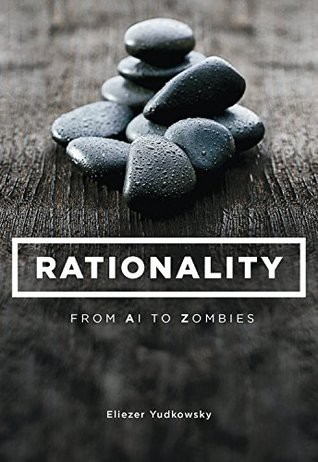Jesper reviewed Rationality: From AI to Zombies by Eliezer Yudkowsky
Review of 'Rationality: From AI to Zombies' on 'Goodreads'
5 stars
Do you consider yourself rational? Do you think being rational is important? After reading this book, my answers to these questions are "not very much at all" and "it's the most important thing in the world". More than anything I've read before, this book gives me the sense of being important, in a way that if more people read this book and get it then the world would be a much, much nicer place to live.
So, what's this book about? Like the title says, it handles the subject of rationality - not the Hollywood stereotype of the emotionless 'rational' person, but rationality as the Art of actually archieving your goals, or 'systematized winning' as the author puts it. Rationality in this sense is not merely some personality trait, but a MORAL imperative if you're serious about doing as much Good as possible (as the book argues much …
Do you consider yourself rational? Do you think being rational is important? After reading this book, my answers to these questions are "not very much at all" and "it's the most important thing in the world". More than anything I've read before, this book gives me the sense of being important, in a way that if more people read this book and get it then the world would be a much, much nicer place to live.
So, what's this book about? Like the title says, it handles the subject of rationality - not the Hollywood stereotype of the emotionless 'rational' person, but rationality as the Art of actually archieving your goals, or 'systematized winning' as the author puts it. Rationality in this sense is not merely some personality trait, but a MORAL imperative if you're serious about doing as much Good as possible (as the book argues much more in-depth).
The topics of the book are very broad: they range from cognitive biases, Bayesian statistics, and the nature of intelligence to politics, religion, science, evolution, AI, philosophy, quantum mechanics, and morality. The common element in all these topics is that Yudkowski uses each of them to point out the ways in which our usual way of thinking leads us astray and how to undertake the difficult task of becoming more rational (i.e. actually winning at life!). Perhaps the best thing about this book is how it regularly it will completely shatter your beliefs about each of the subjects it touches (or at least for me it did).
Yudkowski's writing style is very direct and animated, but he's not afraid to get technical when required. I'm a big fan of his writing but I've heard of other people that they absolutely can't stand it. So it's probably best if you just read something by him and judge for yourself.
Perhaps the greatest point of critique I have against the book is that while reading it may fill you with the need to become more rational, it doesn't mean you automatically become more rational as a consequence. But that's not the fault of the book, but just a sign that this stuff is incredibly hard! There really should be more opportunities to train your rationality skills in practice, something Yudkowski also talks about in the final parts of the book.
There's also a few other things I didn't like (though I don't consider them deal-breakers in the slightest):
- The book (actually 6 books in one) is very long: 1750 pages is nothing to sneeze at. Though even just reading the first part would be worthwhile.
- The book is basically an edited collection of blog posts, this means it often jumps from one topic to another or conversely repeats a point many times.
- The author rants a lot about religion. It's understandable given his background, but for someone who's already an atheist living among other atheists it gets boring after a while.
In conclusion, I think the ideas in this book can (and should!) be presented in a more universally compelling and accessible way. But that shouldn't stop you from reading it, as there currently is nothing else quite like it. It may very well be the most important thing you read in your life!
To finish this review, here are some of my favorite quotes:
"If what you believe doesn't depend om what you see, you've been blinded as effectively as by poking out your eyeballs."
"If science is a religion, it is the religion that heals the sick and reveals the secrets of the stars."
"The world's greatest fool may say the sun is shining, but that doesn't make it dark out."
"You cannot obtain more truth for a fixed proposition by arguing it. To improve our beliefs, we must necessarily change our beliefs."
"There is never an idea so true that it's wrong to criticize any argument that supports it."
"That which can be destroyed by the truth should be."
"When the basic problem is your ignorance, clever strategies for bypassing your ignorance lead to shooting yourself in the foot."
"The truly important problems are often the ones you're not even considering, because they appear to be impossible, or, um, actually difficult, or worst of all, not clear how to solve."
"It is written nowhere in the math of probability theory that one may have no fun."

